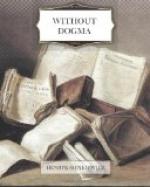26 February.
Yesterday I went again to Warsaw by appointment, to meet a certain Pan Julius Keo, on whose estates I lodged part of the capital I inherited from my mother. Pan Julius Keo wants to pay off the mortgage, and asked me to meet him at a fixed time; and I waited for him the whole day. The devil take their ways of managing any business in this country! He will make five other appointments, and not keep one. He is very rich, wants to get rid of the mortgage, and is able to pay it off any time; and yet—such is our way of transacting business.
From my own observations I long since came to the conclusion that in money matters we are the most flighty and unbusinesslike people in the world. I, who like to go to the root of matters, often pondered over this phenomenon.
According to my ideas, this is the result of the purely agricultural occupation of the people. Commerce was in the hands of the Jews, and these could not teach us accuracy; the cultivator of the soil is unreliable because the soil is unreliable, he is unpunctual because nature has no punctuality. Working in the soil, they gradually take some of its characteristics, which enters into their moral being, and in the course of time becomes an inherited defect.
The knowledge of cause and effect does not restore me to an equable temper. I had to tear myself away from Aniela for a whole day, and what is more, shall have to go through the some process a few days hence; but it cannot be helped. In my aunt’s house I found visiting-cards from Kromitzki,—one for me and two for the elder ladies. I was afraid he might take it into his head to pay us a visit at Ploszow; to avoid that, I went out to leave my card on him. Unfortunately for me, he was at home, and I had to stay half an hour. He began his conversation by telling me that he had promised to call at Ploszow; to which I replied that we had gone there merely for a few days, and would be back in town almost immediately. He asked after Aniela’s mother, and very guardedly after Aniela herself. He evidently wanted to impress me with the fact that he inquired as a mere acquaintance. I am so impressionable that even this gave me a twinge; how I loathe that man! I fancy the Tartars under Batu Khan must have played many pranks in what is to-day Austrian Silesia, when looting the country after the battle of Liegnitz. That those black eyes, like roasted coffee-berries, did not come from Silesian ancestors, I have not the slightest doubt.
He was exceedingly polite to me, because I am rich. It is true, he wants nothing from me,—I do not give him anything, and my being rich is of no advantage to him; but as a financier he worships money. We spoke about the difficulties in which Aniela’s mother was and is still involved. According to Kromitzki, a great deal of her fortune might still be saved if she would part with the estate. Kromitzki looks upon the reluctance to part with ancestral lands as a mere fad. He said he might be able to understand it if she had the means to prevent it, but as the case stood it was mere sentimentality.




